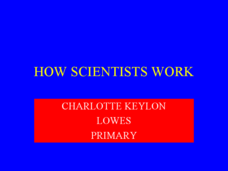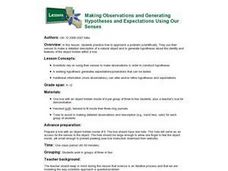CK-12 Foundation
Testing Hypotheses: Einstein
Einstein once said "A person who never made a mistake never tried anything new." Enlist his help in teaching young learners the importance of looking for mistakes in hypotheses. An interactive coaches pupils in the falsifiability of...
Omaha Zoo
I Like to Move It
What do lemurs do best? They move! Lemurs like to jump, run, hop, and climb and it's your class's job to document seven fun lemur behaviors. The class starts by discussing why lemurs are considered primates, and then they isolate seven...
Howard Hughes Medical Institute
Gorongosa: Making Observations Activity
Do you have young scientists wanting to make new discoveries rather than just completing the same experiments? Young scientists use their observational skills to identify animals and patterns in animal behavior. Through tracking...
Curated OER
A Hidden Beauty
Expose the beautiful mystery of bulbs as young botanists learn all about these fascinating plants. They glean information from a short text before observing actual bulbs (consider an onion), and comparing their findings with predictions....
CK-12 Foundation
Development of Hypotheses: Pressure versus Temperature
Is it me, or is it getting hot in here? Middle school science sleuths investigate the relationship between temperature and pressure, then use their observations to form a hypothesis. Questions embedded in the interactive help guide...
Curated OER
Indirect Observation
Students observe obscertainers through indirect observations and make hypotheses about the internal wall structures of the containers. In this indirect observation lesson plan, students make observations of 4 obscertainers with a steel...
PBS
Predicting/Making a Hypothesis
As an introduction to the hypothesis and testing method of investigation, young history detectives engage in a special investigation of a family artifact. After watching a short video that demonstrates the method, they develop a...
PBS
Predicting/Making a Hypothesis
Students analyze information from a variety of sources in order to create a hypothesis about the origin of an interesting family artifact.They create alternative hypotheses based upon available information to demonstrate that some...
Curated OER
Transparent Shoebox Dig
Take this simulated archaeological dig one layer at a time with your young pupils to encourage observation, critical thinking, and careful attention. Using a transparent box full of layers of sand and artifacts, pupils examine the...
Curated OER
How Scientists Work
The arsenal of tools a scientist uses to observe the world are varied. This great presentation gives students a look at some of the strategies they should use when looking at the world around them. The information can be used as a...
Curated OER
Independent Plant Growth Experiment
This is an awesome lesson filled with tons of engaging learning activities. Over a period of weeks learners will make observations, collect plant and analyze plant data, read and review agricultural articles, design and conduct an...
Curated OER
Coal Flowers
Let's make coal flowers! With this fun activity, young learners watch and learn as they grow crystals! With simple household materials and the instructions included in this lesson plan, your class can grow their own crystals. Learners...
Curated OER
The Scientific Method
If the steps that you follow for the scientific method are as follows, this presentation can be useful: observation, question, hypothesis, method, result. Unfortunately, not every scientist or teacher uses the same terminology, The...
Marine Institute
Water Pollution
Sixth graders investigate the various types of pollutants found in water and ways to help prevent water pollution. Through a hands-on experiment, young scholars create samples of polluted water by mixing water with vegetable oil, dirt,...
Curated OER
Making Observations and Generating Hypotheses
Students practice how to approach a problem scientifically. They use their senses to make a detailed description of a natural object and to generate hypotheses about the identity and features of the object hidden within a box.
Curated OER
Theories, Hypothesis, Laws, Facts & Beliefs
In this scientific statements activity, students are given 35 statements and they are to identify if each statement is a fact, law, hypothesis, theory or belief.
Curated OER
Exploration of "Pillbugs"
Fifth graders define vocabulary terms, identify the characteristics of a pillbug, and create a dichotomous key. Then they examine the pillbugs and make observations and record these observations. Finally, 5th graders observe specific...
Curated OER
Understanding the 1855 Census Database
Use data from the 1855 New York census to better understand the Irish immigrant experience during the late 19th century. Young historians analyze information from the census and build three hypotheses regarding the residents of the Five...
Curated OER
Sound and Frequency
Pupils pose their hypothesis, they ready their instruments, then record their observations. This is the science of sound lesson. They move through 5 stations, each focused on a different element of aspect of sound. Check this lesson out,...
Curated OER
Deformed Frogs! - The Parasite Hypothesis
This project provides learners the opportunity to investigate parasites as a possible cause of the observed frog deformities. It asks students to view web-based evidence and interpret whether it supports the parasite hypothesis. Learners...
Curated OER
Viewing Bacteria
Have you ever wanted to know the true structure of E.coli? Does the thought of peering into its "small world" sound exciting? Here is a instructional activity that allows pupils the ability to do just that. Blossoming microbiologists use...
Curated OER
Indirectly Direct
Student form and test hyptheses using indirect and direct observation. They launch marbles to determine the shape of a hidden object.
Curated OER
The Egg Activity
Students comprehend the three basic steps of science: 1) Observation, 2) Statements of cause and effect (Hypotheses), and 3) Testing. By working with an egg, students are required to observe an object that is very common to them. This...
Curated OER
Modeling changes to Ecosystems Part 1
Students record changes in an ecosystem. In this science instructional activity students make a hypothesis about changes in a terrarium. They record their observations. The students conduct an experiment to test their hypothesis.

























